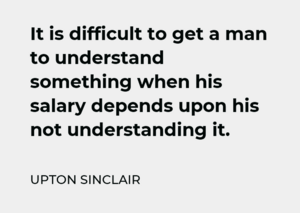Sinclairs Prison: Difference between revisions
m (Pyrope moved page Sinclair's Prison to Sinclairs Prison) |
|||
| (3 intermediate revisions by the same user not shown) | |||
| Line 1: | Line 1: | ||
[[File:Sinclair-quote-salary.png|thumb]] | [[File:Sinclair-quote-salary.png|thumb]] | ||
The concept of "Sinclair's Prison" revolves around the idea that individuals in academic or scientific positions are often constrained by financial and institutional pressures in what they can say and do. This concept draws on a quote attributed to Upton Sinclair: "It is difficult to get a man to understand something when his salary depends upon his not understanding it." | |||
== Key Points == | |||
'''Institutional Challenges:''' Weinstein highlights the lack of individuals with substantial resources willing to lead efforts to address issues within key institutions (like media, universities, and health organizations). He suggests that many of these institutions are failing and that there is a collective indifference or acceptance of this decline among those with influence. | |||
'''Freedom of Dissent:''' The term "Sinclair's Prison" is used to describe the dilemma faced by scientists and academics who may be constrained by their financial dependence on institutions that might not support dissenting views or unpopular truths. This highlights a potential conflict between personal financial security and the pursuit of truth. | |||
'''Accountability and Market Forces:''' Weinstein argues that the current systems of accountability may inhibit genuine inquiry and discussion, suggesting that the truth-seeking apparatus in society is compromised. He believes that wealthy individuals or institutions should be more engaged in financially immunizing academicians from having their paychecks depend on whether they evidence understanding of inconvenient truths power wants buried, thereby protecting the integrity of fundamental research, knowledge, and core institutions. | |||
'''Reflection on Wealthy Individuals:''' Weinstein expresses concern that those with significant wealth—who could potentially fund or support efforts to restore institutional integrity—appear disengaged. He finds it striking that they do not seem to value or invest in the preservation of these shared institutions. | |||
In summary, "Sinclair's Prison" illustrates the complexities and limitations imposed on individuals in academia and science due to financial dependencies and lack of true [[Academic Freedom|academic freedom]]. It raises questions about the role of wealth and power in shaping discourse and institutional integrity, suggesting a need for greater institutional accountability and support for independent inquiry. | |||
== On X == | |||
{{#widget:Tweet|id=1483207855675101184}} | |||
{{#widget:Tweet|id=1483207858401341446}} | {{#widget:Tweet|id=1483207858401341446}} | ||
{{#widget:Tweet|id=1483207861656190976}} | |||
{{#widget:Tweet|id=1483207864348856327}} | |||
== Related Pages == | |||
* [[Academic Freedom]] | |||
* [[Extractive Elite]] | |||
* [[Science, The Endless Frontier (1945)]] | |||
* [[Universal Institutional Betrayal]] | |||
[[Category:Concepts]] | |||
[[Category:Ericisms]] | |||
Latest revision as of 17:06, 17 October 2024
The concept of "Sinclair's Prison" revolves around the idea that individuals in academic or scientific positions are often constrained by financial and institutional pressures in what they can say and do. This concept draws on a quote attributed to Upton Sinclair: "It is difficult to get a man to understand something when his salary depends upon his not understanding it."
Key Points[edit]
Institutional Challenges: Weinstein highlights the lack of individuals with substantial resources willing to lead efforts to address issues within key institutions (like media, universities, and health organizations). He suggests that many of these institutions are failing and that there is a collective indifference or acceptance of this decline among those with influence.
Freedom of Dissent: The term "Sinclair's Prison" is used to describe the dilemma faced by scientists and academics who may be constrained by their financial dependence on institutions that might not support dissenting views or unpopular truths. This highlights a potential conflict between personal financial security and the pursuit of truth.
Accountability and Market Forces: Weinstein argues that the current systems of accountability may inhibit genuine inquiry and discussion, suggesting that the truth-seeking apparatus in society is compromised. He believes that wealthy individuals or institutions should be more engaged in financially immunizing academicians from having their paychecks depend on whether they evidence understanding of inconvenient truths power wants buried, thereby protecting the integrity of fundamental research, knowledge, and core institutions.
Reflection on Wealthy Individuals: Weinstein expresses concern that those with significant wealth—who could potentially fund or support efforts to restore institutional integrity—appear disengaged. He finds it striking that they do not seem to value or invest in the preservation of these shared institutions.
In summary, "Sinclair's Prison" illustrates the complexities and limitations imposed on individuals in academia and science due to financial dependencies and lack of true academic freedom. It raises questions about the role of wealth and power in shaping discourse and institutional integrity, suggesting a need for greater institutional accountability and support for independent inquiry.
On X[edit]

